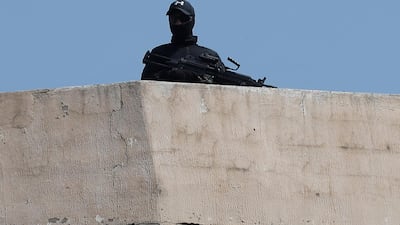Assistant Secretary of the Treasury for Terrorist Financing Marshall Billingslea warned that US sanctions on the Lebanese militant group Hezbollah will target anyone that provides material support for the group, regardless of the sectarian or political affiliation.
Speaking at the Atlantic Council in Washington on Friday, Mr Billingslea appeared buoyant on the impact of the Trump administration sanctions on Iran and its juggernaut proxy, Hezbollah.
“Our efforts are having a clear impact, leaving Iran with scarce funds to spend in its perfidious pursuits,” he said.
“Hezbollah is also feeling the squeeze - its fighters have been furloughed or assigned to reserves, where they earn far lower salaries, its media employees laid off, payment to families slashed,” the US official argued.
These sanctions are expected to continue. Over the summer, Washington has put increased pressure on Hezbollah and sanctioned its security official Wafic Safa and ranking parliamentarian Mohamad Raad in July.
It also targeted the “Jammal Trust Bank” for aiding and transferring money to the group.
Asked by The National if these sanctions will go after Hezbollah's allies and private funders regardless of sectarian and political affiliation, the US official said that "material support" is the main metric that the Treasury uses in targeting Hezbollah.
“If you are a collaborator with Hezbollah regardless of your political party and ideological affiliation, if you’re offering material support we are going to target you,” he said.
“This not about the Lebanese Shia community, this is about Hezbollah.”
Mr Billingslea blamed “disastrous political alliances” for helping Hezbollah “to insert itself into the daily political discourse of Lebanon and to establish itself as a blocking function to democracy.”
The group struck an alliance with the Christian party the Free Patriotic Movement in 2006, whose leader Michel Aoun assumed the Presidency in 2016.
Describing a vast dark funding network for Hezbollah, Mr Billingslea said the party “engages in a wide range of illicit business activities in Lebanon, [that are] well outside the financial sector”
”Pharmaceuticals come to mind, the abuse of free trade zones, the abuse of the airport and the seaport,” he said, adding that “these are all areas where it’s incumbent upon a good government in Lebanon to take back control of their own country.”
During his visit to Washington in August, Lebanese Prime Minister Saad Hariri said that port smuggling was discussed with the US government.
“We will put scanners and cameras on ports and crossings and airports across Lebanon to avoid smuggling,” Mr Hariri said.
Mr Billingslea also reiterated the US commitment to its maximum pressure strategy against Iran.
“Our course remains constant and unchanged - to degrade Iranian finances.”
He said that oil is the primary source of funds for Iran and that "releasing the Adrian Darya and its cargo from Gibraltar, was an expensive mistake."
“It risks putting over $100 million into the coffers of the Qods Force and Hezbollah.”
US Assistant Secretary of State David Schenker was in Lebanon this week, and Lebanese Foreign Minister Gibran Bassil will be visiting the United States next week ahead of the UN General Assembly meeting.

